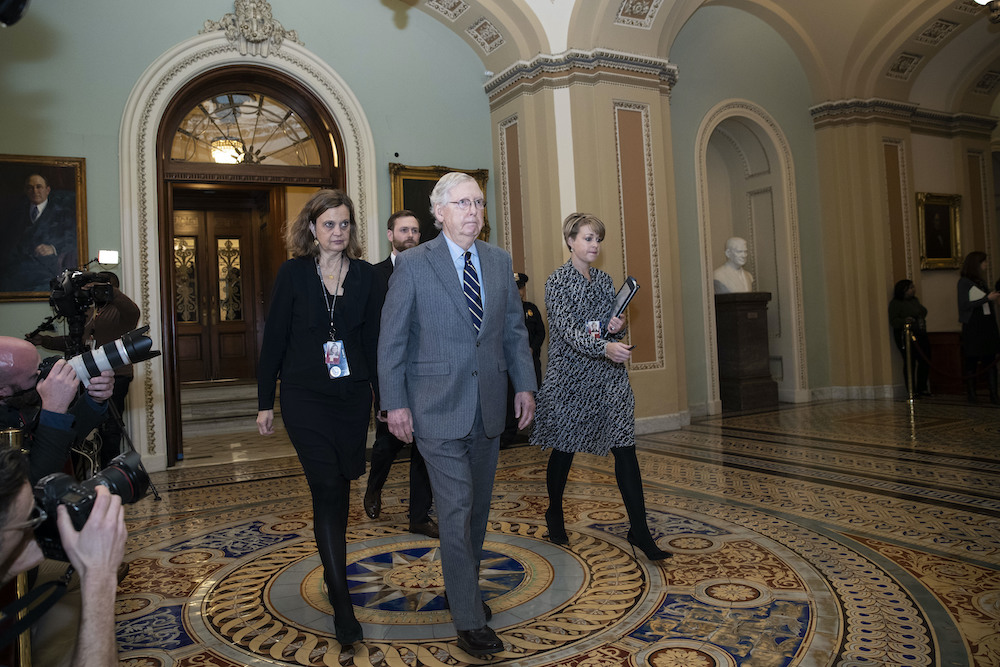
Senate Majority Leader Mitch McConnell departs the Senate chamber after hearing arguments in the impeachment trial of President Donald Trump on February 3, 2020 in Washington, D.C.
By design, there have been no witnesses and limited evidence in President Donald Trump’s impeachment trial in the Senate. In fact, you can argue that the most important information about the president’s decision to halt military aid to Ukraine, the issue at the heart of his impeachment, didn’t come from the trial, but from a whistleblower, former national security adviser John Bolton, and Freedom of Information Act (FOIA) requests filed by journalists.
Throughout the process, journalists have chased information that members of the House of Representatives, who voted to impeach Trump, couldn’t get through subpoenas, witnesses, or other means. That boggles the mind in a system of government built on checks and balances – and in a national moment when the stakes couldn’t be higher.
The number of FOIAs that have been filed related to the president’s impeachment could number in the thousands. MuckRock, a nonprofit FOIA filing platform used by newsrooms around the country, says these requests have been filed on their platform under the following topics: Trump, 905; Russia, 130; Ukraine, 16, and Mueller, 17. And Need to Impeach, founded by Democratic candidate Tom Steyer, has filed around 300 requests through the platform. Searches through FOIA Online, the federal government’s official portal, indicate thousands more requests on these topics.
At the Center for Public Integrity, we have been fighting the administration, using the power of FOIA, to release unredacted emails between the Office of Management and Budget and the Department of Defense about the aid halt. The blacked-out documents were released to Public Integrity under court order in two batches in December. The second batch, released late at night five days before Christmas, renewed the conversation about the timeline for the president’s decision to halt aid to Ukraine.
Last week, hours after senators cleared the way for Trump’s acquittal, the administration filed its legal argument for why substantial parts of 111 emails should remain redacted. An attorney for the Justice Department wrote that 24 of the emails were protected by “presidential privilege” because they reflect communications by “either the President, the Vice President, or the President’s immediate advisors regarding Presidential decision-making about the scope, duration and purpose of the hold on military assistance to Ukraine.”
This is just a variation of what we have heard before. Throughout our legal fight under FOIA, the government has claimed that the documents are privileged, and that public scrutiny would inhibit the free discussion among officials necessary for good policymaking. We couldn’t disagree more. The messages’ disclosure is essential for citizens to understand and debate the actions of the president and his administration, which were found by the Government Accountability Office to have violated the law. We will submit our response on Feb. 14, Valentine’s Day.
Our fight won’t end with the trial because the truth matters, and people should know about an impeachment that is destined for the history books.
Public Integrity’s legal battle with the administration also points to a larger problem in our democracy and just why FOIA matters: We are in an era of limited information and unlimited disinformation. The impeachment trial is evidence of how our democracy has increasingly functioned in an information blackout under this administration. The rules surrounding the trial simply legitimized the administration’s strategy of casting doubt on facts while redacting critical public information – this time, in plain sight in the Senate.
Journalists, too, have had limited access to those who voted on Trump’s fate in the impeachment trial. Members of the press covering the impeachment trial have complained that they are confined to a pen off the Senate floor, making it difficult for them to communicate with senators. While a similar arrangement was in place during the Clinton impeachment trial, in today’s 24-hour news cycle, the decision, coupled with restrictions on the use of electronic devices on the floor, affect journalists’ ability to inform the public.
In this climate, FOIA has become more important than ever. For more than half a century, the law has helped keep our elected officials honest, and information we often take for granted – from consumer safety to political surveillance – would never have seen sunlight.
We wouldn’t know that the Food and Drug Administration inspected only a portion of the diet supplement manufacturers.
We wouldn’t know that the government was surveilling Black Lives Matter activists.
We wouldn’t know that coal miners were being stiffed out of health benefits for black lung disease.
We wouldn’t know that Social Security had paid millions in benefits to suspected Nazi war criminals living in the U.S.
And we wouldn’t know the timeline in Trump’s decision to halt military aid to Ukraine.
Regardless of the verdict in the Senate, the fight for information about the actions that led to his impeachment cannot end with the trial.


